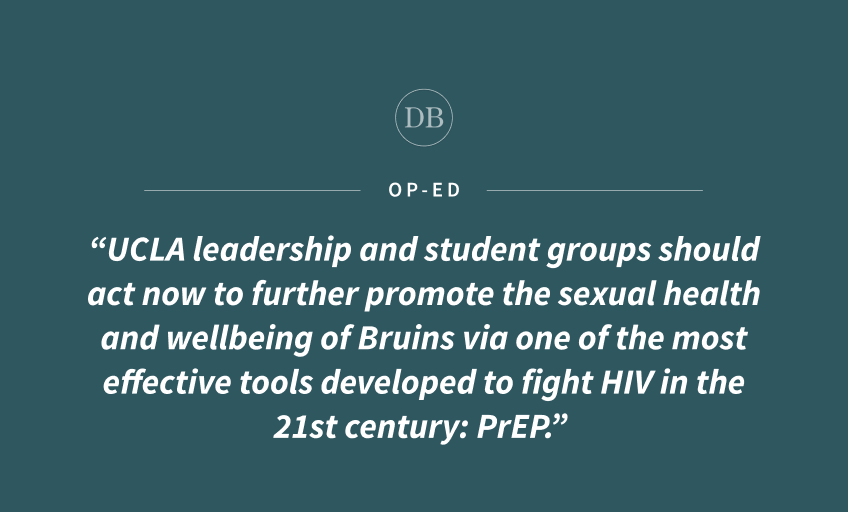Op-ed: Students should be provided with more information, resources on HIV prevention

By Brandon Moore
Feb. 16, 2021 3:29 p.m.
2021 will go down in history books as yet another year in which the American people have been immersed in a multidimensional public health crisis.
With COVID-19 dominating headlines since early 2020, and with ever-changing lockdown rules and updates on the country’s arduous path toward herd immunity continuing to add fuel to our relentless 24-hour news cycle, it is likely that the past 11 months have represented the first period of time in decades in which the advice and guidance of public health experts have taken center stage for so long.
Although most current UCLA students are unlikely to remember – or even have been born at the time of – the beginning of the HIV/AIDS epidemic in the early 1980s, history suggests that there are significant parallels to the public health emergencies of both then and now. And as we mark the 40th anniversary of the discovery of the cluster of Pneumocystis carinii infections in otherwise healthy young men by Dr. Michael Gottlieb and his colleagues here at the UCLA Medical Center – later identified as AIDS – this year it is important to remember that COVID-19 is not the only epidemic we currently face in America.
In 2018, 37,968 individuals were diagnosed with HIV in the U.S., according to the Centers for Disease Control and Prevention, representing more than one million active cases of the virus – transmitted through contact with bodily fluids like blood and semen – that year. However, since the HIV/AIDS crisis of the 1980s and ’90s, life-saving advances in medicine have turned an HIV diagnosis from a death sentence into a chronic condition that does not significantly affect lifespan, and more importantly, has given us a new tool to “stop the spread” of HIV. PrEP, short for pre-exposure prophylaxis, is a once-daily pill regimen marketed as Truvada or Descovy that is up to 99% effective in preventing HIV transmission from an HIV-positive partner to an HIV-negative partner.
Most importantly, the CDC now recommends PrEP for anyone who has multiple sexual partners, does not always use a condom during sex has had a bacterial sexually transmitted infection like chlamydia, syphilis or gonorrhea in the past six months, regardless of their sexual orientation or gender identity. In other words, HIV/AIDS is no longer just a concern for men who have sex with men – and neither is one of the best prevention tools we all have available to eradicate HIV in the U.S., PrEP.
So, what does this have to do with the UCLA community? Both the Arthur Ashe Student Health and Wellness Center and student groups on campus, like the Bruin Love Station, work hard during the year to promote our sexual well-being, including by providing free contraceptives and information about STI screenings. Additionally, organizations like the Pediatric AIDS Coalition remind us each year with Dance Marathon that HIV transmission is still occurring both at home and abroad. But a recent study in the Journal of American College Health suggested very little knowledge among college students about PrEP, and that about 73% do not use condoms at all times during sex, despite the fact that those from ages 13-34 represented the majority of new HIV infections nationally in 2018.
This study, which was done in the South is not necessarily generalizable to the UCLA community, and data about HIV infections or knowledge of PrEP on our campus does not appear to be available. But in the absence of new research specific to local colleges to confirm these results, which would require time and expense, the UCLA administration and student health-focused groups have an easy and inexpensive opportunity to contribute to the global fight to end the HIV epidemic: advertise PrEP to the campus community through social media ads, campus flyers, Ashe Center messages, New Student Orientation presentations and encourage Bruins to meet with their Ashe Center physician or primary care providers to ask if PrEP is right for them. And given that PrEP costs can be a barrier for young adults, these same advertising materials can and should include information about the financial assistance programs available to California residents, such as the California Department of Public Health PrEP Assistance Program, which can reimburse PrEP-related expenses up to 100% regardless of insurance or immigration status.
During the COVID-19 pandemic, all eyes are on public health, but with distribution of the Pfizer-BioNTech and Moderna vaccines to health care workers and at-risk populations occurring now, and with large-scale immunizations eyed for later this year, there is a glimmer of hope that we may bring this crisis under control – meaning widespread public attention to trustworthy public health information may soon fade. At the risk of sounding opportunistic, UCLA leadership and student groups should act now to further promote the sexual health and well-being of Bruins via one of the most effective tools developed to fight HIV in the 21st century: PrEP. We owe nothing less to the UCLA physicians whose work identified AIDS in 1981, and to the estimated 690,000 people throughout the world who died from AIDS-related illnesses in 2019 alone.
Together, we can fight – and stop – the HIV epidemic.
Moore is a third-year human biology and society student.


